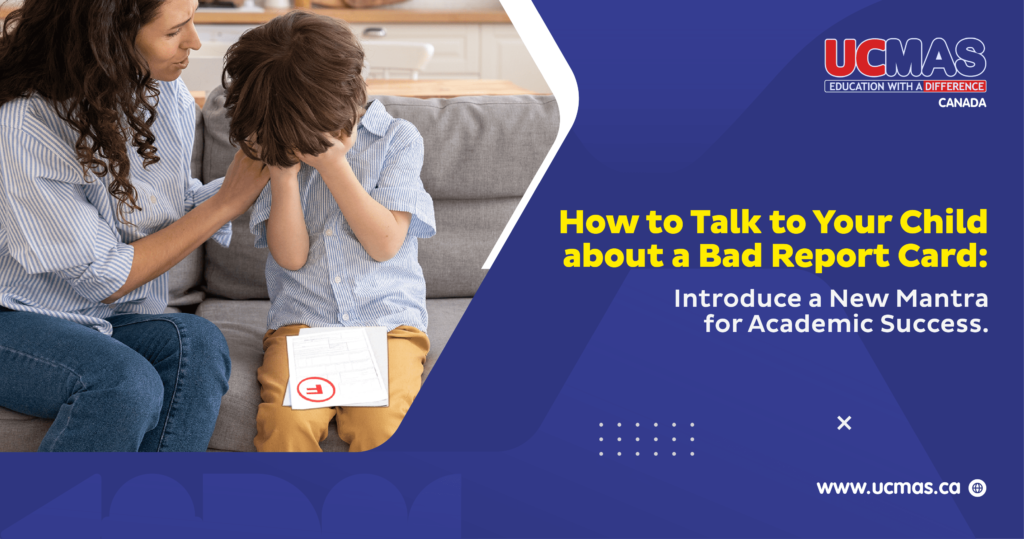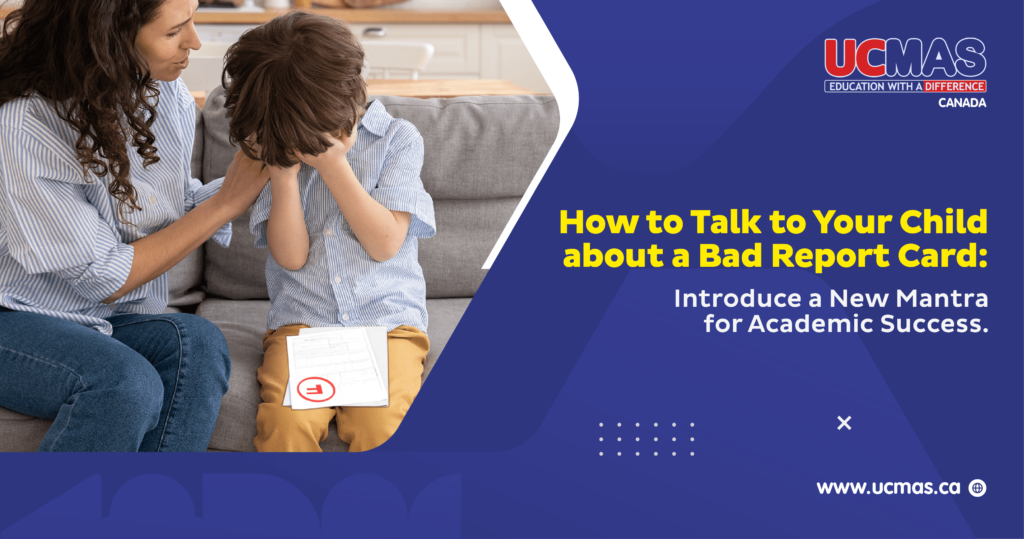
As parents and educators, we all want our children to excel in academics and to have a wide range of options for their future. The journey to achieving these aspirations is not always smooth sailing. Sometimes children fall right into the path to achieve this parental dream, and sometimes they tend to falter and struggle in the process. This evokes a wide range of emotions, not only for you as parents but, most importantly, for children as well.
You might be overwhelmed while holding your child’s report card, frustrated about the poor grades, and questioning your parenting skills. But, while reaching this conclusion is easy, it is imperative to remember that a bad report card is not a measure of your parenting or your child’s abilities. It’s merely an opportunity to reassess your approach to your child’s academic journey.
Gain valuable parenting advice on navigating bad report cards from a successful edupreneur, Megha Karia. Check out the video!
Continue reading for more insights on supporting your child’s academic journey
Reframe The Perspective
Report card day can be a daunting experience for your child. Imagine the stress your child is under as you evaluate their progress at school. The reaction you exhibit after viewing the report card can make or break your child’s attitude toward education. While you might have various reasons to justify the stress that surrounds a deficient or inadequate report card, here are a few reasons to alter your perspective to help your child.
- A report card highlights specific areas of improvement for your child. By identifying these areas, you can adopt different strategies for improvement and development.
- Use the report card to teach your child valuable lessons of resilience and perseverance. Encourage your child to view setbacks as opportunities rather than obstacles.
- Set realistic and achievable goals for your child by breaking down larger academic goals into smaller, more achievable milestones. Celebrate each milestone of small achievements to reinforce their progress.
- A bad report card can be an opportunity to seek additional support and resources. You can explore a wide range of resources for improvement, like seeking additional help from teachers, enrolling in tutoring programs, trying educational tools like mind mapping, abacus math programs, STEM learning, and more.
- Instill a growth mindset in your child by encouraging them to overcome setbacks through hard work and dedication.
6 Things to Remember While Dealing with a Bad Report Card
1. Stay Calm and Avoid the Blame
While it’s natural to feel disappointed about your child’s progress, take a moment to empathize with your child. Remember, that your child may be equally anxious and upset about their grades. Take a moment to calm down and do not react with anger as this will hamper your approach to strive towards better grades. A calm and understanding demeanor will go a long way in this supportive journey toward betterment.
2. Identify the Areas of Concern
Assess the report card and highlight the positive aspects of it. Emphasize areas where they have shown progress and acknowledge their efforts to reinforce their self-esteem. Then, identify the reason why your child’s grades have declined. Sit down with your child and understand which factors could have affected your child’s performance. Is it due to a lack of understanding of the material, poor study habits, social issues, or something else?
3. A Systematic Plan to Achieve the Desired Results
Once you have identified the areas of improvement, set realistic and achievable goals together. A systematic study plan should be time-based and task-oriented. Break down big goals into smaller achievable tasks and set deadlines for each task to help your child stay on track. Follow up daily on your child’s progress in achieving the tasks. Ensure that the planned routine is followed without any distractions.
4. Identify the Best Approach for Your Child
Your discussions with your child and their teachers will provide valuable insights for selecting a proactive approach toward their academic improvement. Explore alternative and success-oriented learning resources that may better suit your child’s learning needs.
One such proven and success-oriented learning program is the UCMAS abacus math program. Learn more about the transformative power of abacus math.
5. Spend Quality time with your child.
Make sure to connect with your child outside of academics. Engage in outdoor activities to refresh their mind, and participate actively in their hobbies and playtime activities. This will encourage an environment for open communication, emotional support, and trust.
6. Make an incentive or a reward plan based on set goals.
Keep the motivation high by celebrating victories. Offer positive reinforcement by rewarding your child for achieving small academic goals or tasks. This could include privileges, treats, or activities your child enjoys.
Take the first step with the UCMAS abacus after-school math program!
The UCMAS abacus math program is a valuable addition to your child’s development and progress. Our diverse after-school math programs are designed with a unique and effective approach to enhance your child’s overall academic success. If you’re looking for a sustainable and effective strategy that can help your child’s grades, the transformative power of abacus math programs is worth considering. Here’s why.
Improved Academic Performance
Abacus math teaches children to engage multiple senses while performing calculations and how to tackle problems in a systemic manner. The art of manipulating the beads on the abacus, and breaking down problems into manageable steps are effective methods that strengthen their mental agility. These cognitive skills not only enhance their concentration, memory, and spatial reasoning but also aid in achieving improved academic excellence.
Building Confidence and Self-Esteem
The abacus after-school program fosters numerical fluency in children. Their success in mastering mathematical concepts instills a sense of accomplishment and pride in their abilities. This boost in self-esteem empowers them to tackle new challenges with enthusiasm and resilience, leading to overall academic success.
Promoting a Positive Attitude Towards Learning
Abacus math programs make math fun, engaging, and accessible to students at all levels. The hands-on approach develops a genuine interest in math and promotes a positive attitude toward academics as a whole.
Foundation of Mathematical Skills
While your child achieves overall development through our after-school program, the most important benefit of this program is the strong foundation of their mathematical skills. Abacus math programs provide a structured and systematic approach that helps your child gain a deep understanding of mathematical concepts. This lays the groundwork for future academic success in more advanced mathematical concepts.
So, what are you waiting for? Tap into the transformative power of this age-old, effective tool for your child’s progress. Start by requesting an info session with UCMAS to make success a lifelong mantra for your child.
Key Takeaways:







